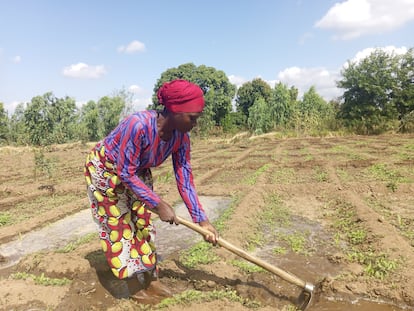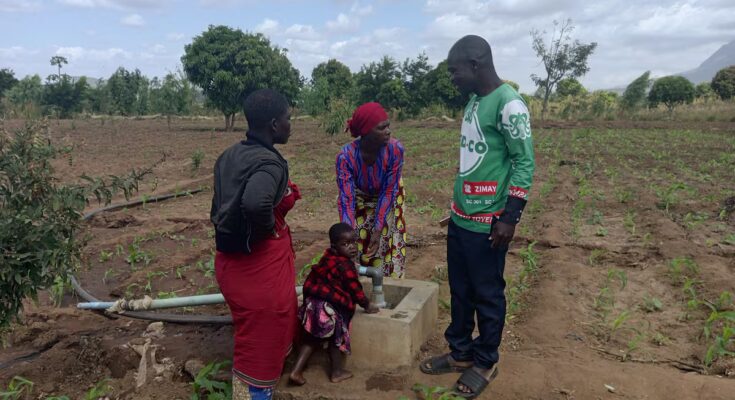Jonos Makaika, a 37-year-old farmer from Chilambe village in Zomba district in southern Malawi, has seen his harvests shrink year after year. “The rains are increasingly scarce and, consequently, the yield of my crops is increasingly poor,” says this father of four children. However, a solar-powered irrigation system changed his life.
The Zomba community had offered land to implement irrigation technologies to reduce hunger and improve nutrition. They built two solar-powered irrigation systems, with the support of the German NGO BMZ, The Hunger Project. The irrigation of Chilambe and Bimbi today allows us to produce food all year round, even in prolonged periods of drought, and to diversify crops: farmers now harvest corn, bananas, mustard or pumpkins.
The rains are becoming increasingly scarce and, as a result, the yield of my crops has been increasingly poor.
Jonos Makaika, farmer from Malawi
In Malawi, approximately 65% of the population depends on agriculture, according to a report by the International Labor Organization. However, the effects of climate change have hit this sector hard, due to the increase in extreme weather events, such as floods and droughts. For example, according to data from the World Food Program (WFP), the drought caused by El Niño, which devastated the region in early 2024, affected 44.3% of Malawi’s cultivated area.
“I personally benefited from this project because before we only depended on rain-fed agriculture,” says Makaika, who presides over the Chilambe irrigation system. “Now we farm twice (a year) and I have earned enough money to buy livestock and a bicycle. I can also pay my children’s school fees and still have enough food,” he says with a smile.
The structures, in existence for four years, consist of two wells from which water is pumped using solar energy to a solid concrete structure with two storage tanks, 10,000 liters each, strategically positioned high up to withstand phenomena such as cyclones, which are increasingly frequent in this south-east African nation. “Because poverty is multidimensional, we analyze how the effects of climate change perpetuate hunger and, consequently, poverty,” Anthony Chilembwe, country director of The Hunger Project in Malawi, explains to this newspaper.
Community work
Although gardens usually belong to families, in Chilambe the community established a collaborative system so that the benefits of irrigation reached everyone. During the rainy season, the owners grow crops in their usual plots; After the harvest, they divide the land into small lots, so that even those without land can access it.
“It’s a community agreement,” explains Chilembwe. “The idea is to ensure that every home within the area benefiting from the irrigation system achieves profitability, because this promotes a sense of ownership and co-responsibility in the maintenance of the system itself. This was the original objective of the project.”
There is a good variety of crops, some hardy, like cassava, and others perennial like banana, which is good for both food security and nutrition.
Anthony Chilembwe, national director of The Hunger Project in Malawi
The model is producing results. “There is a good variety of crops, some hardy, like cassava, and others perennial like bananas, which is good for both food security and nutrition,” adds the head of The Hunger Project.
However, the supply of the two pumping systems is still insufficient to cover the entire cultivation area. “We would like to have more water and more agricultural inputs, such as fertilizers, to get even bigger harvests,” says Mary Juma as she redirects the water to her plot, where corn is sprouting.

Juma, 42 and a mother of five, recognizes that irrigation has transformed her life: “I have benefited these last two years since I joined the system. After collecting three bags from my garden, I also managed to get some from here, which helped me feed my children,” she explains. He continues: “My goal this year is to harvest enough to sell some of it and thus reduce problems at home. The rain is increasingly unpredictable, but now we can control our crops.”
Homemade fertilizers for drought resistance
While farmers in Zomba use solar energy to keep their fields green, in the Dowa district, in the center of the country, other farmers have found an alternative to survive the lack of rain: homemade fertilizers.
Tsanzo Thabwa’s home in the Dowa tobacco district in the center of the country has also directly felt the effects of climate change. Faced with intermittent rains and increasingly drier conditions that compromised their food security, they found a lifeline in agriculture Social Cash Transfer (SCT) Programimplemented by COMSIP, a savings and cooperation program in Malawi, financed by the World Bank and aimed at the poorest populations in rural areas.
The program encouraged beneficiaries to form savings and loan groups, and in 2023 Thabwa and 49 other members attended a course on producing low-cost compound fertilizer, known as mbeyaas they could not afford to buy chemical fertilizers. This fertilizer, in addition to being cheap, has a great capacity to retain moisture in the soil, which allowed Thabwa and his colleagues to protect crops from the effects of drought. As they obtained larger harvests, their income increased significantly.
“After joining the group, we received several training courses. I learned a lot about financial literacy, how to run a business, new farming methods, home priorities and planning, among other things. The training not only opened my eyes to new opportunities but also led me to a better life,” he explains.


